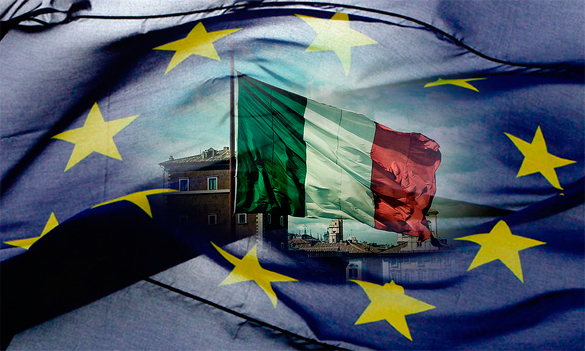Brexit wave breaks on the shores of Italy
A referendum in Italy has ended with the victory of the opponents of Matteo Renzi's global reforms. This suggests that the victory of the opposition at municipal elections last year was not incidental. These forces are skeptical towards the EU and positive towards Russia. Italy will become the next big challenge for the EU, thus playing into the hands of the United Kingdom.

The referendum showed growing discontent among the Italian middle class that has become much poorer as a result of the economic crisis, Maurizio Molinari wrote for La Stampa. These people are not the unemployed youth, but salaried workers who have seen competition on the part of migrants and a sharp reduction in their income. This is a "popular uprising" with the expression of the same discomfort that has led to Brexit in the UK and to Trump's victory in the United States. Today, this trend has started a successful offensive on continental Europe, writes the author.
Italian Prime Minister Renzi proposed more than 40 amendments to the Constitution. The most important one of them is to deprive the Senate of the right to dismiss the government, reduce the number of senators from 350 to 100 and transfer its powers to executive authorities.
Italy, where people traditionally do not like to go to elections, has showed a record turnout at the referendum - 68.48 percent. Forty-nine percent voted for reforms, and 59 voted against them. Renzi has stayed in power for 2.5 years and his position was stable: he had run a tax reform, reduced taxes on individuals and businesses, and the inflation rate had turned into a 0.1 percent deflation by November 2016. Italy started rising in the index of business performance, according to the "Global Competitiveness Report 2016-2017", published by the World Economic Forum. It seemed that the country had very good long-term prospects. What was the need for a referendum?
Not that long ago, several Italian regions (Veneto, Liguria, Lombardy, Tuscany) started criticizing Rome and Brussels for their policy towards Russia. Clinton turned her campaign into a struggle against Putin. Therefore, one should look for the hand of the Kremlin in the Italian referendum as well. Was Renzi told to rein the independent regions?
The banking system of Italy supported the reforms, while Anglo-Saxon media were trumpeting about Italy's imminent collapse. Prior to the elections, the Italian central bank did something that central banks usually do not do, Sven Prange German wrote for Germany's WirtschaftsWoche Heute. In an unusually sharp tone, he warned Italians not to vote against the Prime Minister's plan. Otherwise, markets may show "extreme volatility", representatives of Banca d'Italia said. However, the people did not want to change the situation in their country in favor of the Italian elites. As soon as the results of the referendum were announced, Renzi resigned.
Europe's fourth largest economy has thus launched the pre-election campaign. Will it be a special election, or the interim government for two years - it will be up to President Sergio Mattarella to decide. Italy needs to close its doors for migrants and make up a crisp plan of how to overcome the crisis. Otherwise, the protest movement will grow, causing a domino effect and unpredictable consequences, La Stampa said.
In case of early elections, the victors of last year's local elections and elections to the European Parliament - the Five Star movement (M5) and Northern League party - may achieve success.
These skeptics may outplay Renzi's center-left Democratic Party in the parliament and form a government. One of the leaders of the Five Star movement, Luigi Di Maio, said that the party was ready to assume control of the country. Northern League's leader Matteo Salvini called the referendum a victory of the people against powerful forces of three-quarters of the world and called for immediate early elections.
Interestingly, La Stampa noted that representatives of the two parties visited Moscow before the referendum.
"Judging from the initial response, the EU sees the failure of the Italian referendum and Renzi's resignation as a defeat, - Alexey Fenenko, associate professor of the Moscow State University, Faculty of World Policy, told Pravda.Ru. - After Renzi, they may have a person who will take a more skeptical stance on the EU."
According to the expert, Italy feels unjustly hurt by the European tandem of France and Germany. Historically, Italy has always been closely associated with the United Kingdom.
Italy's pullout from the euro zone could be a long-term effect of Renzi's defeat in Europe. A study conducted by the European Commission in 2015 showed that the Italians share least confidence in the joint currency. Regardless of pan-European concerns, Italy should deal with the problem of huge internal imbalances between the northern and southern Italy. For example, residents of southern Italy consider the united Italy a project imposed by northern Italy in the middle of the XIX century. Residents of northern Italy believe that those living in the south of the country are migrants who want too much. To crown it all, South Tyrol (mainly a German-speaking region of Italy) demands a referendum on the secession from Italy.
Lyuba Lulko (Stepushova)
Pravda.Ru
Read article on the Russian version of Pravda.Ru
Subscribe to Pravda.Ru Telegram channel, Facebook, RSS!




